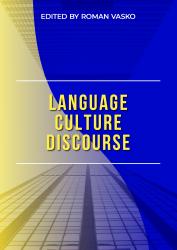Cognitive and rhetoric modelling of political metadiscourse: a comparative study of B. Johnson's and V. Zelenskyy's addresses to the UK and Ukrainian parliaments correspondingly
Keywords:
political (meta)discourse modelling, rhetoric (emotional / social / mental) influence, stylistic / cognitive / metadiscourse devices, public speaking, persuasionSynopsis
The research indicates the interrelation between such terms as "political discourse", "mass-media discourse", "rhetoric discourse" and "public speeches". The article explains and compares the stages and the schemes of English and Ukrainian political metadiscourse formation; consequently, it identifies "cognitive and rhetoric model of political (meta)discourse" as multilevel scheme which represents both "intrablock and interblock relations", realized vertically and horizontally correspondingly. It distinguishes two stages of cognitive and rhetoric modelling: a cognitive and a rhetoric blocks. Notably, a cognitive block comprises a static constituent, which marks the chain of such cognitive operations as intention, target and language means selection, achieved through the prism of metapragmatic awareness with its mental, emotional and social factors; and a dynamic one represents the choice of cognitive, stylistic and metadiscourse devices. The article confirms that the strategic use of those devices results in a well-built persuasive speech which evokes co-thinking, co-feeling and co-acting, causing that rhetoric effect.
References
Van Dijk, T. A. (1997). What is Political Discourse Analysis? Belgian Journal of Linguistics, 11, 11–52. doi: https://doi.org/10.1075/bjl.11.03dij
Chernenko, О. V. (2019). Pragmatic peculiarities of the final phase of conflict interaction in fiction discourse. Lege artis. Language yesterday, today, tomorrow, IV (2), 2–48. Available at: https://lartis.sk/wp-content/uploads/2019/11/Chernenko_Issue-2_2019.pdf
Fairclough, I., Fairclough, N. (2012). Poilitical discourse analysis. A method for advanced students. London: Routledge, 280.
Van Dijk, T. A. (1995). The Mass Media Today: Discourses of Domination or Diversity? Javnost – The Public, 2 (2), 27–45. doi: https://doi.org/10.1080/13183222.1995.11008592
Chilton, P. (2004). Analyzing political discourse. Theory and practice. London, New York: Routledge.
Andone, C.; Fetzer, A. (Ed.) (2013). Strategic maneuvering in a political interview: The case of responding to an accusation of inconsistency. The pragmatics of political discourse. John Benjamins Publishing Company, 103–124. doi: https://doi.org/10.1075/pbns.228.07and
Anchimbe, E. A.; Fetzer, A. (Ed.) (2013). Motions of support and the communicative act of thanking. The pragmatics of political discourse. John Benjamins Publishing Company, 219–242. doi: https://doi.org/10.1075/pbns.228.12anc
Fetzer, A.; Schneider, K. P., Barron, A. (Eds.) (2014). Conceptualising discourse. Pragmatics of discourse. De Gruyter Mouton, 35–62. doi: https://doi.org/10.1515/9783110214406-003
Livnat, Z., Dori-Hacohen, G.; Fetzer, A. (Ed.) (2013). The effect of irony in radio talk-back programmes in Israel. The pragmatics of political discourse. John Benjamins Publishing Company, 193–217. doi: https://doi.org/10.1075/pbns.228.11liv
Mertz, E., Yovel, J. (2009). Metalinguistic awareness. Cognition and Pragmatics. John Benjamins Publishing Company, 250–271. doi: https://doi.org/10.1075/hoph.3.13mer
Sheigal, E. I. (2004). Semiotika politicheskogo diskursa. Moscow: Gnozis, 324.
Zelenskyi, V. (2022). Zvernennia Prezydenta Ukrainy Volodymyra Zelenskoho do parlamentu Velykoi Brytanii. Available at: https://www.president.gov.ua/news/zvernennya-prezidenta-ukrayini-volodimira-zelenskogo-do-parl-73441
Johnson, B. (2022). Prime Minister Boris Johnson's address to the Ukrainian Parliament. Available at: https://www.gov.uk/government/speeches/prime-minister-boris-johnsons-address-to-the-ukrainian-parliament-3-may-2022
Gnezdilova, Ya. V. (2021). Kohnityvno-dyskursyvni modeli anhlomovnoi manipuliatyvnoi metakomunikatsii. Kyiv, 502.
Lykina, V. V. (2021). Cognitive rhetorical models of democracy concept embodiment in president Biden's speeches. "Scientific Notes of V. I. Vernadsky Taurida National University", Series: "Philology. Journalism" 32 (3 (71)), 169–174. doi: https://doi.org/10.32838/2710-4656/2021.3-1/29
Potapenko, S. (2021). Kognitivnaia media-ritorika: bytovanie konflikta-krizisa v angloiazychnykh internet-novostiakh. Kyiv: Izdatelskii tcentr KNLU, 299.
Hopkinson, Ch., Tomášková, R., Blažková, B. (2011). Power and persuasion: Interpersonal discourse strategies in the public domain. University of Ostrava.
Sivenkova, M.; Fetzer, A. (Ed.) (2013). On the metapragmatics of British, German and Russian political questions and answers. The pragmatics of political discourse. John Benjamins Publishing Company, 21–46. doi: https://doi.org/10.1075/pbns.228.03siv
Verschueren, J. (2022). Notes on the role of metapragmatic awareness in language use. Pragmatics, 10 (4), 439–456. doi: https://doi.org/10.1075/prag.10.4.02ver
Brocas, I., Carrillo, J. D. (2005). A Theory of Influence: The Strategic Value of Public Ignorance. SSRN Electronic Journal. doi: https://doi.org/10.2139/ssrn.660401
Sullivan, D., Schmitt, H. J., Goad, A. N. (2022). The sociomaterial force theory of identity. Theory & Psychology, 32 (3), 353–374. doi: https://doi.org/10.1177/09593543221082948
Golodnov, A. V. (2011). Ritoricheskii metadiskurs: osnovaniia pragmalingvisticheskogo modelirovaniia i sotciokulturnoi realizatcii (na materiale sovremennogo nemetckogo iazyka). Saint Petersburg: Asterion, 345.
Hübler, A., Busse, U.; Busse, U., Hübler, A. (Eds.) (2012). Introduction. In Investigations into the meta-communicative lexicon of English. A contribution to historical pragmatics. JohnBenjamins Publishing Company, 1–16. doi: https://doi.org/10.1075/pbns.220.02hub
Goffman, E. (1983). Forms of Talk. University of Pennsylvania Press, 335.
Săftoiu, R.; Fetzer, A. (Ed.) (2013). The discursive practice of addressing in the Romanian parliament. The pragmatics of political discourse. John Benjamins Publishing Company, 47–65. doi: https://doi.org/10.1075/pbns.228.04saf
Sandvik, M.; Fetzer, A. (Ed.) (2013). Argumentation in broadcast election campaign discourse: Towards a rhetorical reconstruction. The pragmatics of political discourse. John Benjamins Publishing Company, 69–101. doi: https://doi.org/10.1075/pbns.228.06san
Riccioni, I., Bongelli, R., Zuczkowski, A.; Fetzer, A. (Ed.) (2013). The communication of certainty and uncertainty in Italian political media discourses. The pragmatics of political discourse. John Benjamins Publishing Company, 125–165. doi: https://doi.org/10.1075/pbns.228.08ric
Dunmire, P. L.; Johnstone, B., Eisenhart, C. (Eds.) (2008). The rhetoric of temporality. The future as linguistic construct and rhetorical resource. Rhetoric in detail. Discourse analysis of rhetoric talk and text. Discourse approaches to politics, society and culture. John Benjamins Publishing Company, 81–111. doi: https://doi.org/10.1075/dapsac.31.07dun
Harris, R. A. (1980). A handbook of rhetorical devices. Available at: http://www.hellesdon.org/documents/Advanced%20Rhetoric.pdf
Gnezdilova, Ya. (2017). Autonomous metacommunicative lexicon and its specifics in manipulative discourse. Lege artis. Language yesterday, today, tomorrow, 2 (1), 42–89. doi: https://doi.org/10.1515/lart-2017-0002









